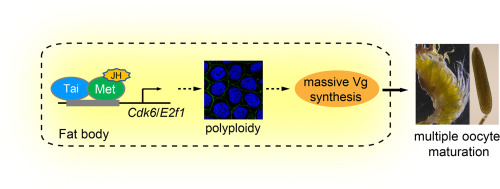Insect Biochemistry and Molecular Biology ( IF 3.2 ) Pub Date : 2018-09-08 , DOI: 10.1016/j.ibmb.2018.09.002 Zhongxia Wu , Wei Guo , Libin Yang , Qiongjie He , Shutang Zhou

|
Juvenile hormone (JH) is known to promote cell polyploidization for insect vitellogenesis and egg production, but the underlying mechanisms remain poorly understood. Using the migratory locust Locusta migratoria as a model system, we report here that the expression of cyclin-dependent kinase 6 (Cdk6) and adenovirus E2 factor-1 (E2f1), the core mediators in cell cycle progression is regulated by JH and its receptor Methoprene-tolerant (Met). JH acts through its receptor complex comprised of Met and Taiman to directly activate the transcription of Cdk6 and E2f1. Depletion of Cdk6 or E2f1 results in significantly decreased ploidy, precocious mitotic entry and increased cell numbers in the fat body, accompanied by substantial reduction of Vitellogenin gene expression, blocked ovarian growth and arrested oocyte maturation. These findings indicate a crucial role of Cdk6 and E2f1 in JH-regulated polyploidization and vitellogenesis as well as a novel regulatory machinery for endocycling in insects.
中文翻译:

少年激素通过激活Cdk6和E2f1的转录来促进蝗虫脂肪体细胞多倍化和卵黄发生
少年激素(JH)可以促进昆虫卵黄发生和产卵的细胞多倍化,但其基本机制仍知之甚少。使用飞蝗飞蝗作为一个模型系统中,我们在这里报告,表达细胞周期蛋白依赖性激酶6(CDK6)和腺病毒E2因子-1(E2F1),细胞周期进展的芯介质是由JH和其受体调节耐甲氧戊丁(Met)。JH通过其由Met和Taiman组成的受体复合物起作用,直接激活Cdk6和E2f1的转录。Cdk6或E2f1耗尽导致明显减少的倍性,早熟的有丝分裂进入和脂肪体内细胞数量的增加,同时伴有卵黄蛋白原基因表达的大量减少,卵巢生长受阻和卵母细胞成熟。这些发现表明,Cdk6和E2f1在JH调控的多倍体化和卵黄形成中起着至关重要的作用,并且为昆虫内循环提供了一种新型的调控机制。































 京公网安备 11010802027423号
京公网安备 11010802027423号